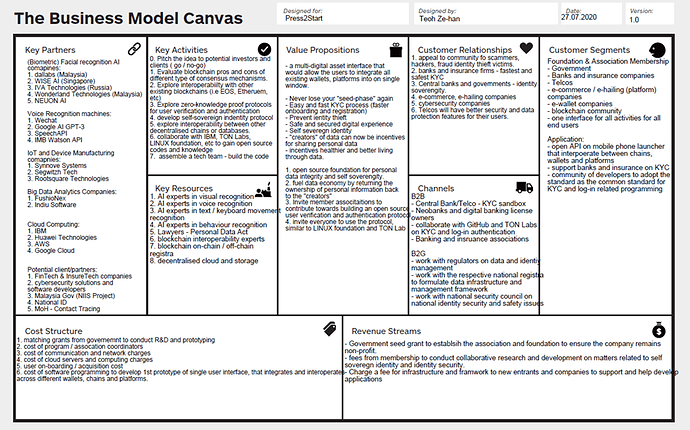Don’t have the technical or coding knowledge to be able to execute this. Thought I just share my thoughts around “Digital Sovereignty” here with the forum.
Description:
To work as a unified “Key” for all platforms, transaction, smart contracts and e/crypto-wallets. While keeping user identity safe to drive self-sovereignty. Incorporating the encryption of blockchain technology and using a distributed ledger technology to keep user identity safe. Incorporating zero-knowledge proof protocols with biometric identification and verification.
Rationale:
The decentralised technology of Blockchain presents an infrastructural shift that will greatly transform and repair the digital economy. The notion of self-sovereign identity is a way to make the digital economy more inclusive and equal. The SSI model seeks to resolve the trust issues that come with identity management. In this approach, a user can store all their identity-related data on their own device. An SSI begins as a number that is exclusive to the individual. This private key can then associate with public keys on all identity-related matters. From this basis, the user can then make identity claims which a Trusted Provider can then validate and sign off on. Identity-holders can ,therefore, allow others the right to see and authenticate their claim without having access to the original information or non-related data. This is where the SSI model ends itself to Zero-Knowledge Proofs (ZKP).
Statement of need:
True self sovereign identity requires the users to own the key to the “vaults of data registrars” keeping fragments of their identity. As the world moves further into digital, users would need to bridge between the physical and digital world by creating a “digital twin” that only could be accessed and activated by the user, to combat identity theft, cybersecurity fraud and prevent large corporations or platforms from using personal data without permission or fair reward to the owner of the data.
Statement of benefit:
Never need to remember passwords for log-ins for identification and validation, safer and secured access and transactions through Press2Start SSI protocols, and have ease of mind knowing the information and data is not being stored in a centralized location.
Value:
Avoiding potential losses of thousands and millions of dollars each year due to identity theft and fraud. Users can transact and interact on the internet with ease knowing that the transactions are safe and secured. Enforcing self-sovereignty to the users through zero-knowledge proof protocols and decentralizing identity databases connected only through a private key owned by the user, only accessible through his/her biometric and proof of lifelines.
Positioning Statement:
Using biometrics as part of an identity management system comes with a few advantages. If people can identify themselves through their biometrics, they no longer need to use passwords. However, the use of biometrics within an identity management system may raise significant security and privacy risks, depending on how biometrics are used, stored, and permissioned. A blockchain is decentralized insofar as its transaction history is immutably recorded and maintained by a distributed network of computer nodes, in order to prevent systemic theft.
Strategic Position:
Position Press2Start as a non-profit organization in ASEAN to spearhead the data and digital economy, first by establishing the Self Sovereign Identity (SSI) framework amongst the 10 countries in ASEAN:
Open source foundation for personal data integrity and self sovereignty.
Fuel data economy by returning the ownership of personal information back to the "creators“ (users)
Invite private and public sectors to participate as member associations to contribute towards building an open-source user verification and authentication protocol. Governments agencies join for free, while the private companies would have to pay a membership fee that would enable them to co-finance projects with the participation from the governments.
Invite private companies to collaborate and to develop more applications leveraging on the protocols, like LINUX Foundation, Github and TON Labs.
